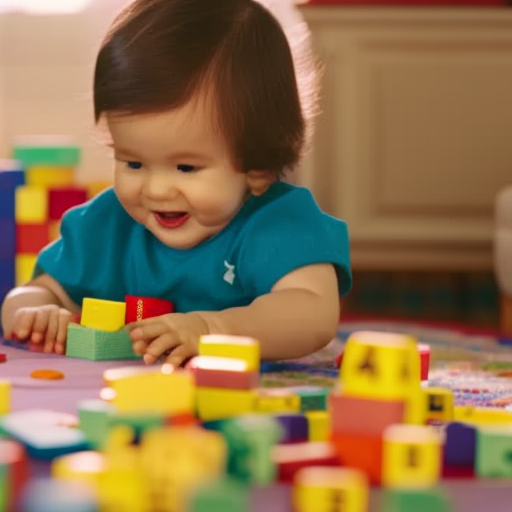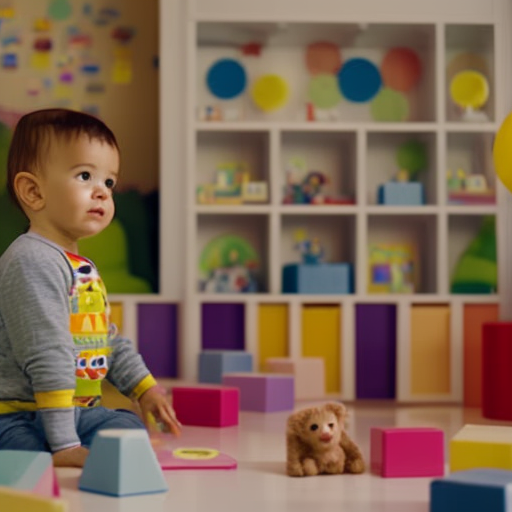"Cherishing Little Steps - A Haven for Baby and Family Journeys"
Building Toddler Language Skills
Have you ever wondered if you can actually help your toddler develop their language skills? Well, the answer is a resounding yes! Building toddler language skills is not only possible but also crucial for their overall development.
By creating a language-rich environment and engaging in conversations with your little one, you can set them up for success in communication. Reading aloud to your toddler and playing language games can make learning fun and interactive.
Encouraging vocabulary expansion and developing listening and speaking skills further enhance their language abilities. So, if you’re eager to support your toddler’s language development, keep reading to discover effective strategies that will foster their communication skills.
Key Takeaways
- Early language development is crucial for cognitive abilities and provides the foundation for learning, reasoning, problem-solving, and social interactions.
- Creating a language-rich environment through activities, games, and reading helps build vocabulary, comprehension, and expressive language skills.
- Engaging in conversations with toddlers, asking open-ended questions, and actively listening to their responses promotes vocabulary building, critical thinking, and communication skills.
- Reading aloud to toddlers with picture books expands their vocabulary, develops listening and comprehension skills, and fosters a love for reading.
The Importance of Early Language Development

Understanding the significance of early language development is crucial for fostering strong communication skills in your toddler. Research has shown that language development in the early years has a significant impact on cognitive abilities. Language skills provide the foundation for learning, reasoning, problem-solving, and social interactions.
As a parent, you play a vital role in promoting your child’s early language skills. By engaging in conversations, reading books, and singing songs with your toddler, you’re creating an environment rich in language stimulation. This helps in building their vocabulary, comprehension, and expressive language skills. Additionally, providing opportunities for your child to listen to and interact with different languages can enhance their overall linguistic abilities.
It is important to remember that children learn best through meaningful interactions and experiences. By responding to your child’s babbling and attempts at communication, you’re encouraging them to explore and develop their language skills further. Creating a language-rich environment at home, filled with books, music, and conversations, can greatly support your toddler’s language development.
Creating a Language-Rich Environment

To create a language-rich environment for your toddler, provide a variety of opportunities for meaningful interactions and exposure to language. Engage in activities that promote communication and language development. Encourage your child to express themselves through talking, singing, and storytelling. Engage in conversations with your toddler, asking open-ended questions and actively listening to their responses. This helps them develop vocabulary and language skills.
To further enhance language learning, incorporate technology into your toddler’s daily routine. There are many educational apps and websites designed specifically for young children to learn language skills. Use interactive games and videos that focus on vocabulary, phonics, and sentence structure. However, it’s important to remember that technology should complement, not replace, real-life interactions.
Create language-rich activities within your home environment. Label objects in your child’s room, such as toys and furniture, to help them associate words with objects. Read books together and encourage your child to point out and name different objects or characters. Sing songs, recite nursery rhymes, and play word games to make learning fun and engaging.
Engaging in Conversations With Your Toddler

Start engaging in conversations with your toddler by asking open-ended questions and actively listening to their responses. This will not only help in building their vocabulary but also promote language fluency. Conversations with your toddler are an opportunity for them to learn new words and practice using them in context. By asking open-ended questions, you encourage your toddler to think and express themselves, rather than giving one-word answers. Actively listening to their responses shows them that their thoughts and opinions are valued, which in turn encourages them to communicate more.
To further emphasize the importance of engaging in conversations with your toddler, here is a table showcasing the benefits:
| Benefits of Conversations with Your Toddler |
|---|
| 1. Builds vocabulary |
| 2. Promotes language fluency |
| 3. Encourages critical thinking |
| 4. Enhances communication skills |
Engaging in conversations with your toddler is a simple yet effective way to support their language development. It allows them to explore new words, express their thoughts, and improve their communication skills. Remember to create a safe and nurturing environment where your toddler feels comfortable expressing themselves. So start talking and listening to your little one today, and watch their language skills grow!
Reading Aloud to Boost Language Skills

Engage in conversations with your toddler by asking open-ended questions and actively listening to their responses. This is a great way to boost their language skills, but it’s not the only method you can use. Reading aloud to your toddler is another powerful tool for language development.
Here are three ways reading aloud can help enhance your toddler’s language skills:
-
Vocabulary acquisition through storytelling: When you read stories to your toddler, they’re exposed to a wide range of words and phrases. This exposure helps them expand their vocabulary and understand the meaning of different words in context. As you read, encourage your toddler to ask questions and discuss the story with you, further enhancing their vocabulary acquisition.
-
Using picture books for language development: Picture books are a fantastic resource for language development. The colorful illustrations capture your toddler’s attention and make the story more engaging. Point out different objects, animals, and characters in the pictures, and encourage your toddler to describe what they see. This not only improves their vocabulary but also helps them express their thoughts and ideas.
-
Building listening and comprehension skills: Reading aloud requires your toddler to listen and understand the story. As you read, pause occasionally to ask questions about the plot, characters, or what might happen next. This helps develop their listening and comprehension skills, as well as their ability to follow a narrative.
Reading aloud to your toddler is a wonderful way to boost their language skills. By incorporating storytelling and picture books into your daily routine, you can help your toddler acquire new vocabulary, develop language skills, and foster a love for reading.
Playing Language Games for Fun Learning

Continue enhancing your toddler’s language skills by incorporating language games into their playtime. Learning through play is an effective way to engage your child and promote language development. Interactive language activities offer a fun and stimulating environment for your toddler to learn and practice new words, sentence structures, and communication skills.
One language game you can play is ‘I Spy.’ This game encourages your toddler to use descriptive words and develop their vocabulary. Choose an object in the room and say, ‘I spy with my little eye something that’s red.’ Your child then has to guess the object based on your description. As they become more proficient, you can switch roles and let them be the one to spy and describe.
Another game is ‘Simon Says.’ This classic game helps improve listening skills and following directions. Give simple instructions like, ‘Simon says touch your nose’ or ‘Simon says clap your hands.’ Your toddler will have fun trying to imitate your actions and understand the concept of following commands.
‘Rhyme Time’ is another engaging activity. Sing nursery rhymes or create simple rhymes together. This game helps your child recognize patterns in words, enhances phonological awareness, and promotes language rhythm and pronunciation.
Encouraging Vocabulary Expansion

To further expand your toddler’s vocabulary, it’s important to actively encourage their language development. Here are three effective strategies you can use to encourage vocabulary expansion in your little one:
-
Encouraging Word Association: Help your toddler make connections between words by using word association. For example, when you see a picture of a dog, say the word ‘dog’ and encourage your toddler to repeat it. Then, associate other words with ‘dog,’ such as ‘bark’ or ‘tail.’ This helps them understand the relationships between words and builds their vocabulary.
-
Using Gestures: Incorporate gestures and body language to enhance your toddler’s understanding of words. When you say a word like ‘jump,’ demonstrate the action by jumping yourself. Your toddler won’t only hear the word but also see the corresponding action, making it easier for them to grasp and remember the meaning.
-
Engaging in Conversations: Engage in conversations with your toddler regularly. Talk to them about their day, ask them questions, and encourage them to respond. This not only exposes them to a wide range of vocabulary but also helps them practice using words in context. Provide positive reinforcement and praise their efforts to boost their confidence and motivation.
Developing Listening and Speaking Skills

Enhance your toddler’s language development by actively fostering their listening and speaking skills. Listening activities play a crucial role in developing these skills, as they help toddlers recognize and understand different sounds and words. Engage your child in activities such as reading aloud, singing songs, and playing with musical toys to expose them to different sounds and enhance their listening abilities.
Encourage your toddler to repeat words and phrases after you, as this helps them practice their speaking skills. If you notice any difficulties or delays in your toddler’s language development, seeking help from a speech therapist can be beneficial. Speech therapy can provide targeted interventions and strategies to support your child’s listening and speaking skills.
A speech therapist can assess your toddler’s communication abilities and create a personalized plan to address any challenges they may be facing. Remember to create a language-rich environment for your toddler, where they’re constantly exposed to new words and engaged in conversations. Talk to them about everyday activities, name objects, and describe what you’re doing. This won’t only build their vocabulary but also encourage them to communicate and express themselves.
Supporting Language Development Through Play

Engage your toddler in play to support their language development.
Play isn’t only a fun and enjoyable activity for toddlers, but it also plays a crucial role in their language growth. Here are three ways you can incorporate play to help your toddler develop their language skills:
-
Sensory play for language development: Sensory play involves activities that stimulate your toddler’s senses, such as touching, smelling, and listening. By providing opportunities for your child to explore different textures, smells, and sounds, you can help them build their vocabulary and enhance their language comprehension. For example, playing with water, sand, or playdough can introduce new words and concepts while engaging their senses.
-
Incorporating music into play for language growth: Music has a powerful impact on language development. Singing songs, rhymes, and playing musical instruments can help your toddler develop their listening skills, rhythm, and language patterns. Music also provides a fun and interactive way to learn new words, expand vocabulary, and improve pronunciation. So, don’t hesitate to incorporate music into your playtime routine.
-
Interactive storytelling and pretend play: Encourage your toddler to engage in interactive storytelling and pretend play. This can involve using toys, puppets, or even everyday objects to create imaginative scenarios. By engaging in these activities, your toddler can practice their communication skills, storytelling abilities, and learn how to express themselves using words and gestures. This type of play also fosters creativity, problem-solving, and social interactions.
Frequently Asked Questions
How Can I Address Speech Delays in My Toddler?
You can address speech delays in your toddler through early intervention and exploring speech therapy options. It’s important to identify any underlying issues and work with professionals to provide the support and strategies needed for your child’s language development.
What Are Some Strategies for Encouraging My Toddler to Use More Words and Phrases?
You can encourage your toddler to use more words and phrases by using play as a way to promote language development. Visual aids, such as flashcards or books, can also support their learning.
How Can I Help My Toddler Understand and Follow Instructions?
To help your toddler understand and follow instructions, try using simple language and giving one-step commands. Use visual cues, like pointing or gestures, to support their comprehension. Repeat and reinforce instructions consistently for improved listening skills.
Are There Any Specific Activities or Games That Can Help Improve My Toddler’s Pronunciation?
To help improve your toddler’s pronunciation, engaging in activities and games can be beneficial. Simple activities like reading aloud, singing songs, and playing sound-based games can help develop their speech skills.
What Should I Do if My Toddler Is Struggling With Certain Speech Sounds or Articulation?
If your toddler is struggling with certain speech sounds or articulation, it may be helpful to consider speech therapy. Additionally, engaging in phonics exercises can aid in improving their pronunciation and overall language skills.
Conclusion
In conclusion, building toddler language skills is crucial for their cognitive development. By creating a language-rich environment and engaging in conversations, parents can foster their child’s vocabulary expansion and listening skills.
Reading aloud and playing language games are also effective ways to boost language skills in a fun and interactive manner. Remember, supporting language development through play is key.
So, start stimulating your little one’s linguistic abilities today for a brighter future filled with flourishing communication and comprehension.


